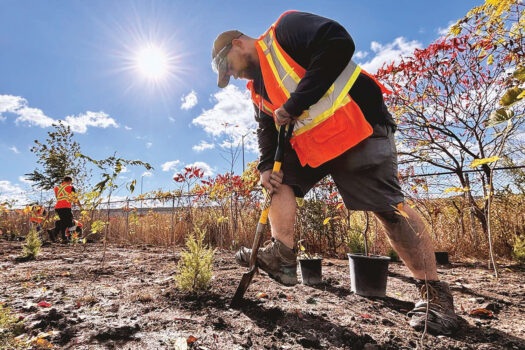LO Membership and Chapter Coordinator
 March is Women’s History Month, so to celebrate, I chatted with some successful, influential, female Landscape Ontario members. These women represent different sectors of the green profession, including: maintenance, design, construction and nursery growers. They are leaders within their own companies and all have strong voices within Landscape Ontario.
March is Women’s History Month, so to celebrate, I chatted with some successful, influential, female Landscape Ontario members. These women represent different sectors of the green profession, including: maintenance, design, construction and nursery growers. They are leaders within their own companies and all have strong voices within Landscape Ontario.
- Lindsay Drake Nightingale, president of Yorkshire Garden Services.
- Lexi Dearborn CLD, owner/designer/project manager at Dearborn Designs & Associates and Siteline Photography
- Kristal MacMillan, operations manager at Christine’s Touch Gardening.
- Sarah Johnston, president, Greenlife Wholesale Nursery.
How did you get into your green career?
LDN: I worked in the not-for-profit social service field for about 15 years and realized I was burning out and in need of a change in direction. As a child, I had always been in the gardens of my family and friends, as well as puttering (badly) in my own gardens and vegetable plots. So I quit my job and worked for a summer at Valleyview Gardens before heading back as a full-time student at Humber College in the Landscape Technician program.
LD: I started at a very young age gardening with my grandmother, however, my family told me this wasn’t a career for ‘girls’. I was in my early ’40s when I decided to take courses at the University of Guelph to become a Master Gardener. I realized how much I loved the design process and watching a project come together, so I started a design company. Over the years, I’ve taken on project management to ensure projects are completed as designed.
KM: Sheer luck. I knew the owners outside of work and was looking for a change of scenery from my profession at the time (I was a chef). I joked around with them that I should come work for them and was surprised when they replied, "Actually, we can use a hand with a big install." So I joined in…. and never left!
SJ: My son was working as a landscaper for another company. I was working for a publishing company that decided to close its Ottawa office. I had just finished establishing a garden at our newly-built home and had always loved gardening. I had a marketing and sales background, but no business experience. I submitted a business plan to the YMCA Careers in Action, a government funded program. It offered full funding for a nine-month program offering five days a week training on everything you needed to know to start a business. I was among the 25 submissions that were approved from over 1300 applications.
What is the best part about your job?
LDN: I love the client interaction. I love doing walkabouts with clients and explaining how we can make their gardens sparkle. The one-on-one interaction is most enjoyable.
LD: I like working with people and designing amazing projects from their wish list of ideas. My job is creative, inspirational, and challenging — a good fit for my personality.
KM: Working with a team of happy, like-minded people. Working outside in all kinds of weather, all day… and making things look awesome.
SJ: Client contact and service. 16 years ago, very few companies were providing only horticultural services. Many offered hardscape services. Female clients tend to be more interested in plants and I find that, as a female service provider, I am accepted more readily as trustworthy and honest. Of course, the British accent certainly helps in regard to knowledge and experience!
What is the least favourite part of your job?
LDN: The paperwork. Whether it is ensuring that accounts receivable are up-to-date, taxes are filed, contracts are done and signed, HR is accurate, etc. It’s a necessary evil and when I am in the zone, everything is done, but sometimes I need motivation to get a move on with it.
LD: Honestly, not being heard. When a client asks a question and I answer it, and then they turn to the man standing beside me and ask the same question. He answers it the in the same words as I did, and they listen to him. It has gotten better over the years; however, I find this part of the job very frustrating.
KM: Time away from my family in the busy spring months. But this balances out over the course of the year, so it’s not as bad. A close second is dog poop!
SJ: That I am in the office more than outside with the crew and planting. There is this saying, “by working eight hours a day, you may eventually get to be a boss and work 12 hours a day.” In landscaping, they just forget to add “12 hours a day in the office!”
What is your advice for someone starting out?
LDN: Join Landscape Ontario. Join your local business network association. Talk to your business development bank (if you are starting a new business) and network, network, network! Even if you are a more introverted person, go to the meetings and events and sit beside someone and ask questions. No question is too small or silly. We all like to answer questions and give advice to the newbie in the crowd, because we were all new at one time.
LD: You have to like people to be in this profession. If you don’t like people and talking to people, this might not be the job for you.
KM: If you start working in this job and you feel tired and sore, yet satisfied when you get home at the end of the day, then stick with it. There is soooo much you can learn and so many cool things that can be done in this industry. It really is quite vast. Do a lot of self-directed learning. Get books and gardening magazines. Ask questions. Observe those who have been doing this for a long time.
SJ: Stick to what you know best and don’t try and be all things to everybody. Network with peers locally and find like-minded owners that hold the same company values and client service levels. Create a referral network. Hire staff that have other skills than you, and always hold your staff in high regard.
What is something you hope to see change/develop in the green industry in the future?
LDN: This is a tough one. I have been involved with Landscape Ontario in various capacities for almost 20 years and I have seen a great deal of change, but then sometimes no change at all.
LD: I think we need to ‘talk up’ landscaping as a great career for women. There are amazing opportunities for professional and personal growth, flexibility to look after family (when needed), we can create and build beautiful outdoor spaces and have an impact on the environment, now and in the future. Women have the opportunity to make this happen. We can be the legacy.
KM: A continued push for professionalism, so that we are all treated as skilled service providers and not as hired help.
SJ: We need greater access to LO training in the Ottawa area. Chain saw certification is an example. I had to become a member of the Woodlot Association to access their training program for my staff. We need to develop partnerships with local colleges and other associations to offer more localized, hands-on training, as well as webinars, to increase accessibility of education.
Myscha Stafford can be reached at myscha@landscapeontario.com or 1-800-265-5656 ext.2333.








